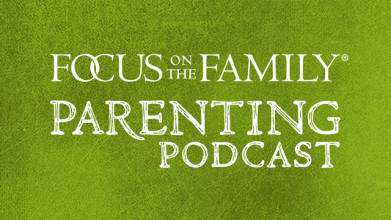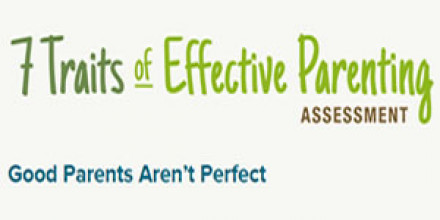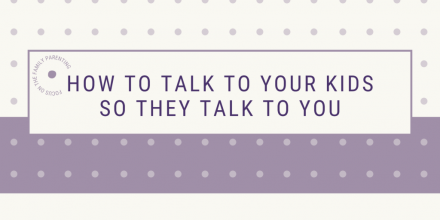Preview:
Dr. Henry Cloud: When you’re saying to a kid, “You need to do your homework,” and he’s playing a video game, he looks up and goes, “Well, obviously, I don’t. I mean, I’m fine,” (laughs). Thank you very much. I don’t feel a need to do this.
End of Preview
Jim Daly: Do you know my son (laughs)?
John Fuller: Some great perspective there from Dr. Henry Cloud, and, uh, you’ll hear more from him. It’s a fun, energetic conversation today, on Focus on the Family with your host, Jim Daly. I’m John Fuller. We’re talking about how you can transfer responsibility to your children, how you can get them to see that they do need to do their schoolwork, and again, teaching them important life lessons while maintaining a really strong relationship with them. Now, this conversation with Dr. Cloud occurred a few years ago, but the lessons given are as true and needed today as ever before. And I think you’re really going to enjoy the conversation.
Jim: John, setting boundaries for our kids can be so difficult. If you’re honest, most of us as parents struggle with how to do that consistently, and how to do it well. And, man, thousands of letters and Facebook comments have come into Focus on the Family about this very issue, and this is one of those key areas where parents really do struggle. How do we do it better? Are we doing it right? Are we messing up our kids, or are we being too laid-back? And today, we want to talk about that, and provide some tools to evaluate where you’re at in that parenting approach, and we want to help you see if you’re going about it the right way. Dr. Henry Cloud will bring some great wisdom for us today.
John: Indeed, he’s been here a number of times, and is very popular as a speaker and writer, and he’s a trained psychologist. He’s written a number of books, including a title with Dr. John Townsend that we’ll be discussing today. It’s called Boundaries with Kids, How Healthy Choices Grow Healthy Children. Here now is that conversation with Dr. Henry Cloud on Focus on the Family.
Jim: Henry, welcome back to the program.
Dr. Cloud: Good to be back.
Jim: What are boundaries? You and your cohort, John Townsend, have written a lot about boundaries with different application. Boundaries for kids is where we’re living right now. John, you, and I both, and even you, Henry, you have two teenagers in your home, right?
Dr. Cloud: I do, two teenage girls, 13 and 14.
Jim: So, is your sophisticated professional psychology background helping you as a parent?
Dr. Cloud: Yeah, it’s because I have seen people bang their head against a wall, and now I know how to do it, so, you know, it’s just (laughs)…
Jim: So isn’t it… I mean, it’s amazing, what these critters come up with.
Dr. Cloud: It is, you know, I think parenting is just a riot. It is hard. There are those moments in the trenches. There’s stuff we all worry about, but it’s just so much fun. But it’s not fun for everybody. I was getting a haircut a few weeks ago, and the guy cutting my hair said, “So you got any kids?” I said, “Yeah, two girls, 13 and 14. It’s such a fun, I love the teen years, because it’s so fun.” And he goes, “Yeah, I got one. She’s 16,” and I said, “Don’t you think it’s fun?” And I’ll never forget this. He goes, “Not yet (laughs).” And I said, “Oh, that’s too bad.” We started to talk about it, because these can be awful, awful experiences as well, and it can start way before teen times. And basically, the concept of boundaries is one of the big, big helpful concepts, because what it does is it brings structure to the chaos. And it brings structure to what we’re actually trying to do, which is to grow mature adults at the end of this process. You know, we forget sometimes that parenting is not about parenting. Parenting’s always about the future. You know, being a parent is the only job that God designed for you to get fired from.
John: Well, let me ask you about that, because I think so often in my own parenting efforts, and I think Jean would agree with this, we sometimes get stuck in looking at the, the crisis in the moment. We don’t take that long view, because we’re caught up emotionally with the problem, whatever it might be. Some, you know, minor, some perhaps major, where you’re really concerned about the pattern that you’re seeing in your teenager, just to take that as an example, 13, 14, 15. And you begin to panic, and you’re going, okay, we’ve failed. We haven’t done the job. How does a parent keep that long-term perspective in view, in the moment of crisis?
Dr. Cloud: It’s really, really, really, really important, because you said some key words there. You know, panic is one (laughs), and parenting doesn’t really occur well when we’re in panic mode. I mean, if you’ve ever seen an accident scene, right, when the EMTs show up, they’re the ones that aren’t panicking. They’re the ones that are kind of the big people in the room, and they’ve got the cooler heads. The problem is that a lot of times, kids will tap into our panic-stricken parts of us, right?
John: They know the buttons.
Dr. Cloud: They know the buttons, and it’s very, very important to have an overall approach to parenting where we’re remembering, it’s not about the homework. It’s not about the room, cleaning the room up. It’s not about what she or he just said to their sibling, or to you. What it’s about using that moment for the maturity of the child. And how do we stay reminded of that? Well, one of the best ways to stay reminded of it is to get away from it and think about it. You know, I believe strongly that you don’t do parenting alone. You’ve got to do parenting with other parents, and I think what happens when you get with other parents, whether it’s in a mom’s group, or a dad’s group, or a couple’s group, or it’s something at your church, what it does is, it pulls you out of those moments. And you start to hear as a group, “What do you guys do about video games? What do you guys do about homework? What do you guys do about the bad boyfriend? What do you guys do about this?” And it starts to normalize these situations. Not only normalize it, but you start to get above it and think, okay, what am I really trying to build here? You know, what is all this parenting stuff about? And then you, then you stop dealing with the moment, and you start to use the moment in service of what you’re trying to do. That’s a big shift in parenting.
Jim: I hear what you’re saying, but I really, … the practical application of this is in that moment when, in our case, big brother might be picking on little brother, or vice versa. How does a parent find the right moment to, okay, this is big enough to engage? How do we not make mountains out of molehills?
Dr. Cloud: Well, that’s a really good question, the last part about that. I would think, look, depending on ages of kids, there’s always a continuum. Okay, number one is, if there’s injury or damage being done, we intervene, right? So if kids are hurting each other, whether it’s toddlers or teenagers, it’s not the time to teach them a lesson. You know, the cops would come in and handcuff the one who’s hitting the other one, right? So in whatever our form of that, you know, I might say to the girls, my two girls, if they’re in a squabble like that. I go, “Whoa, stop. That wasn’t cool, and stop it,” and say, “You know, that’s not okay.” And then from that, you get a kind of, of feeling of, are they seeing what I’m saying or not. And if they say, “Gosh, you’re right, I’m sorry,” or, “Okay, I’ll say it a different way,” then fine. But what you usually get at that moment is, “Well, she”… I go, “Stop. No, she nothing. I’m talking about you right now. What did you just do? That’s not okay. Okay, do you want to say it a different way? First of all, tell me what you did that’s not okay.” And so, sometimes we have to intervene, but there are other times, like the situation that you said, the boys are there, and they’re calling each other names. And you go, “Guys, hold on a second. Do y’all really like to interact that way?” Because see you’re seeing… nobody’s getting injured, but it maybe not is the coolest thing. I’ve had that happen with my girls, where at moments, I’ve said, “Whoa, guys, this is… What are you doing? Do y’all really want to talk to each other that way?” And sometimes, they’ll turn to me and say, “Dad, we’re sisters. Go away (laughs).”
Jim: And let us figure it out.
Dr. Cloud: Let… You know, and it’s the normal sister banter, but other times, you can see, yeah, you know, that, that wasn’t cool. And, and so I think that the main principle here is that, as parents, we must get into the proactive mode where we have a toolbox. See, when we get into problems as parents is when we’re reacting instead of proacting. So a surgeon has got a lot of different tools there on the tray, right? And he or she will pick up the appropriate one at the moment. When we’re reacting, we’re not choosing what we’re gonna do there. And so, it’s very important, the first boundary with kids is the boundary where the parent realizes, I’m separate from them, and whatever they’re going through at the moment, I’m separate and I get to make some choices of how I want to deal with this. Sometimes, we might arrest one of them. Sometimes, we might want to talk about it, and there’s a lot of room in between.
Jim: Well, I love that analogy of the tools on the tray because you talk about the avoiding tool, and the zapping tool, if I could put it in that vernacular. What were you getting at with the ignoring and zapping parenting style? That’s a little too close to home because I think I can do that. I can ignore, and I can zap.
Dr. Cloud: There is an ignore and zap parenting style, and what that is is, you know, we’re sort of distant from it, and we kind of let it build up, let it build up, let it build up, and, and then we swoop in, and, like, wee, you got a… you know, there’s some sort of screaming, and that never helps.
Jim: Let me ask you because it’s so obvious. That never helps, but why do we do it so consistently as parents? Why do we end up there going, waaa?
Dr. Cloud: Well, you know, the more I parent, and over the years, the more I’ve worked with parents, I find that, that so many times, it really is a combination of, we’ve never learned the tools. You know, we love to play sports we’re good at. Right? And we love to do things we’re good at. But sometimes, you know, this discipline thing, or conflict resolution, or helping with homework, or setting goals, or things like that are areas where we just sort of unplug from sometimes because we don’t know how to do it. But we know something’s wrong, and then we will, many times, parent in the way that we were parented. And we’ll just kind of, you know, do what wasn’t helpful for us, but, you know, it’s all I got, so I’ll do it to them as well.
And one of the interesting things that’s helped me is, when the Bible says, “The anger of man does not achieve the righteousness of God.” When you learn that that little verse has a lot of neuroscience behind it. When you learn that when we are expressing anger to anyone, to teach them something or get them to do something, their brain is not taking it in, and we can film this. I mean, or we can hook up their brains and see it.
Jim: So it’s literally not sinking in.
Dr. Cloud: It’s literally, when they feel threatened, they may be nodding, but they’re nodding for security reasons. They’re nodding to get you to calm down. They’re not building new circuitry that’s gonna turn into new behavior. But, when you are in a connected space, a warm, connected, empathic space, and talking about the issue, and exercising discipline or limits, and talking about choices, and making them kind of work with it, you’re still setting the limit. See, you can be…and learn this phrase. It’s a good one for all of us. You can be hard on the issue, and yet soft on the person.
Jim: Hmm.
Dr. Cloud: You know, this table is hard, right, and what that means is, I can’t move it, okay? Well, that’s how we want to be as parents. You know, if there’s certain, certain things we do not allow in this house, I can be very hard on that, meaning that fence isn’t gonna move. But I can say it to my child in a way that’s soft and respectful of the person, and say, “You know what? I know it’s frustrating to you that you can’t get the chainsaw and redecorate the furniture, but really, we’re not gonna change on that. So I’d suggest you do something else.”
Jim: Right.
Dr. Cloud: And if you don’t, ABC is gonna happen.
Jim: You know, where that’s played out for me, especially with one of my sons, and I won’t out that person. But, oftentimes, if I have conflict trying to get him to do something, what I have found is if I just say it and walk away, and give him processing time, he actually gets up and does it. If I stay in it and harp on him, he kind of digs in. So it’s been an interesting observation for me that if I just say, “Listen, I need this done, and I don’t want to be the one to have to do it, because this is something you should be able to do for us, and for the household”. Maybe it’s taking out the trash, or whatever it might be. And then I’ll just spin and walk away and go on with my stuff. It’ll take him about two to three minutes, and then he’ll get up…
Dr. Cloud: Mm-hmm.
Jim: … and he’ll get it done.
Dr. Cloud: Jim, you have said so many important things right there. I mean, literally, we could do an entire show on this one concept, and the one concept is self-control. When you look at the brains of human beings, okay, if you take a little toddler and hook their brain up, and play with the little peg thing, and, and hit the pegs with the hammers, their brain sort of has a little activity. Well, you hand them the hammer and say, “Now, you do it,” that brain goes crazy, because God designed humans to be control freaks. Let me say that again. God designed humans to be control freaks.
Jim: Is it fair to place that on God’s part, or was that our flesh (laughs)?
Dr. Cloud: Well, hold on. Well, that’s the problem, okay? He designed us to be control freaks, but he designed us to have the control and be freaky about having control over one thing, ourselves, self-control. It is the Fruit of the Spirit. What we do in the flesh, and in the fallen nature, we abrogate self-control. I don’t want to be in control of myself. I want to control you. If I’m upset, I want you to change. I want you to do… And what we do is, we try to play God, and have control over everything but ourselves. Now, what you did with your kid right there, you put him in control. You said, “Here’s what I would like. Here’s the expectations.” Now somewhere, you’ve probably said, “If you don’t do it, that’s gonna mean certain things. If you do do it, it’s gonna mean certain things.” But you’ve stayed in control of yourself, and you’ve said, “Look, it’s up to you. You can do it or not do it. This is what I want, and I’ll come back and check.” So now, what does he have? He has autonomy. He has freedom.
Jim: Huh.
Dr. Cloud: And what parents often don’t realize is, your goal, one of the goals for child-rearing is to put them in control. It’s called self-control. They’re the only ones that can stop yelling at their sister.
Jim: Right.
Dr. Cloud: They’re the only ones that can do their homework.
Jim: You can’t make them.
Dr. Cloud: We want to build self-control. You can’t make them do anything. What I do is, I manage the relationship, the resources, the tone, the teaching, the discipline, and all of that so I can actually do something which is incredible. I can leave the room because they’re gonna be in control of their own behavior.
John: What fascinating content we’re getting today from Dr. Henry Cloud on Focus on the Family, and I’ll encourage you to get his book, Boundaries with Kids. He co-wrote that with Dr. John Townsend, and it’s really great core parenting material. And we can tell you how to get the book and a CD of our conversation if you’d like to listen again, or share that, or download the audio. The details are at focusonthefamily.com/broadcast or give us a call. Our number is 800, the letter A, and the word FAMILY. In fact, we can send a copy of the book, Boundaries with Kids, to you as our thank-you gift when you make a generous donation of any amount to the ministry of Focus on the Family today.
Jim: Henry, let me keep going in this area, because I think within the Christian community particularly, Christian parents, we are expecting a lot from our kids. And we, I believe, and I see it in my own household, where we want to control that behavior. Because what they’re doing is outside the boundary for us.
Dr. Cloud: Right.
Jim: So we begin to over-exert that control. They don’t own their behavior. Now they’re going off to college, and what we’re seeing in the community, researchers like Dr. Kara Powell from Fuller are finding that these kids are going off the deep end. Now, thankfully, many of them come back. But when you said the warden’s not looking (laughs), the kids are going out of control. And a lot of Christian homes are experiencing this right now, where the kids are, for the first time, they’re out from underneath that parental control…
Dr. Cloud: That’s right.
Jim: … that Christian parental control, and they’re, they’re really going wild. How can we do our best as a parent in that role as Christians to prepare them for that experience? What are some of the things we need to be cognizant of to make sure that our kids don’t take the wrong path?
Dr. Cloud: Well, it’s a really, really important point, because again, what we want to build in kids is self-control. Now, a moment ago, you said something about control. You know, you want to control their behavior in the house, right? Well, think about this.
Jim: And outside the house, frankly.
Dr. Cloud: (Laughs) Right. Here’s what you have control of. You don’t have control of their behavior. You have control of the house.
Jim: Right.
Dr. Cloud: And you gotta realize, you know, it’s your house, right? And so, you decide this is gonna happen this way in my house, and this is gonna happen this way in my house, and these are certain things that aren’t allowed. Now, when Joey decides that Joey’s gonna behave in a certain way, I’m in control of the house. And Joey, guess what? That’s not allowed here, and when people do that… if I did what you just did, then I would get a consequence, too, right? So here’s the way it works. If you do that, this is the way this house works. These are the ways of this house, and if you do that, certain things happen. Then, Joey learns, gosh, if I sow to the spirit, I reap life, and if I sow to the flesh, then I reap all sorts of death, right? And the death of my dreams, the death of my privileges, the death of, of a lot of stuff.
Jim: Freedom (laughs).
Dr. Cloud: Freedom, freedom, freedom. And we forget how important freedom is, both not only the freedom for them to be able to do things, but the freedom for them to be able to make their own choices. Now, what I’m not saying here is an absence of limits. In fact, I’m being much harsher in a way than a controlling parent, because when we’re nagging and controlling, and using relational consequences, nothing really bad is happening to Joey. Joey’s tuning you out. He or she is getting detached, and they’re going off. And they’re gonna find a different object of attachment to meet their needs. And it might be the bad boyfriend’s that’s the last one you ever wanted to show up at your house, you know, for a teenage daughter. But the harsher way in the good sense, the harsher way is when they learn the realities of what their choices bring them. Now, we don’t only do this in the big things. See, this is the big deal. What we’re trying to do is build character, and character happens in the moments. I’ll give you a great example. Yesterday, our 14-year-old, she was off with some friends, and one of the things that we want to do is put her in control of her own money, right? I don’t want to be a vending machine. I need money for this. So we figured out an amount. She’s got certain chores to do. She has to do those, and we make a deposit in her debit card account, went down to the bank, had her sign up for it to learn all this stuff. She’s got a debit card. She knows she has a certain amount of money that she earns, and that comes on, you know, biweekly or something, okay? So she goes on this outing with a bunch of friends, and she calls. And she says, “Well, there was this… You know, went to my favorite store, and there was this shirt and I really wanted it. And, and I spent it, and now, I need some money for food.” And you know what answer she got?
Jim: Oh, well.
Dr. Cloud: It was an “oh, well.” It’s like, wow, tell me about the shirt. You know, well, it’s great, and this… Well, that’s cool. So now, what, what was this other question? Well, I need some money for… Well, I think you already spent it, but, you know, sorry. I mean, I hope you enjoy the shirt. And she’s like, what? And, and so, she’s learning this is how this works, but there’s no drama. There’s no whatever… look, it’s your money. You get to spend it. If you’d rather spend it on the shirt than be able to, you know, eat out with your friends today, that’s fine. But you do it in the moment.
Jim: The question I wanted to ask in the last couple of minutes here is more on temperament, because I would think that parental temperament must play a role in this. And what I mean by that, you could take any personality profile test, but where you have a softer, gentler person, or the driving personality in the mom and dad. How does that play into that temperament? Again, for Jean and I, Jean’s biochemistry background, she’s black and white in her thinking. She can be a little stronger on the rules than me, the business degree guy, you know. Oh, you know, it’s generally in the right ballpark. It’s a big enough number. Let’s move this direction, and I see that in our own temperaments between Jean and myself.
Dr. Cloud: Are you talking about the temperament of the parents, or the children?
John: The temperament of the parents, and how we apply our parenting styles in that regard. How, how much does that play into it, in terms of being too strict, or too loose, and all those kinds of things?
Dr. Cloud: Yeah, one of my favorite sayings is, “You know, the pickier one rules (laughs).”
John: No, it’s true.
Dr. Cloud: And when you think about it, that’s not how it ought to be. That’s just a description, because the pickier one is going to speak up quicker, right, and have more kind of expectations, and more kinds of preferences.
John: Well and set the boundaries.
Dr. Cloud: And set the boundaries. And so, it’s really, really important… again, you don’t do any of this stuff, you don’t make up a strategy on the battlefield.
John: Mmmm.
Dr. Cloud: You know, what general ever said, “Okay, let’s go fight the war, and when we get out there, we’ll figure out what to do”? That’s not what you do. What you do is, you sit down. First of all, the generals sit down, and they figure out what’s the war we’re trying to win here, and what battles do we need to make sure we’re gonna win. And what battles are we not gonna fight? Because that becomes a very important part of any strategy, what you’re not gonna do.
John: Well, that’s a great example of how to be a proactive parent.
Dr. Cloud: Can I say something to dads?
John: Sure.
Dr. Cloud: And, and some moms, but I hear this from dads a lot. Dads go, “I know I’m supposed to be a parent, but I’m way better at work, and I’m not that good at home.” And I go, “Stop it. Stop.” In fact, I did a seminar at a corporation on this topic. Leadership at home. I said, “You listen to me, Mr. CEO. You’re great at work. Why? Why are you great at work? Because you know how to lead. Let me tell you what you do. First thing you do, what does a leader do? They define a vision, a desired future. The next thing that you do, you engage the talent. You get your team together. You define their roles, and what they’re supposed to do. The third thing you do is, you got a strategy, and you plan, and you execute that. The fourth thing you do is, you hold them accountable, and you get an accountability system that’s built around the group. And then you fix the problems you find, and you go capture market share.” All right, so here’s what I want you to do. I want you to call an executive team meeting at home. I want you to sit the group down like you’re at work and say, “Okay, guys, we’re gonna have… it’s June 1st. We’re gonna have a summer. What’s our vision for this summer? What do we want to, at the end of the summer, look back and say, ‘Look what we did this summer’? And let’s get some different goals. We want to learn some stuff. We want to have some adventures, et cetera, et cetera.” So then, then what do you do? You engage the talent. Okay, Joey, everybody said we want to go camping. Joey, you’re in charge. You’re really good at that. You’re in charge of bringing us a plan, or figuring out some options there, and we get everybody involved. And then we find out the roles, and then we say, “Okay, how are we gonna make sure that everybody’s doing their job, and hold each other accountable?” What are you talking about, you can’t be a parent? Your kids are needing exactly what you do at work. Sometimes, we make this thing so outside of the realm of human competence when it’s exactly how God designed the prefrontal cortex of the brain. To be able to figure out where I want to end up, and steps to get there. And yet, we kind of unplug when we ought not to.
John: Well, and those are good motivations, and good ideas. Dr. Henry Cloud, author of the book Boundaries with Kids, with your co-author John Townsend. We’re into it. I’ve gotta come back. I’ve got more questions about the laws that you outlined in your book, the law of power, the law of motivation. Let’s come back next time and cover some of those to equip parents to do a better job than what they’re doing today. Can you stick with us?
Dr. Cloud: I can. We all need it.
John: We do look forward to hearing more from Dr. Henry Cloud next time as we hear about setting boundaries as a way of teaching children to be responsible adults in the future. Now, his book, Boundaries with Kids, is full of practical, tangible ideas you can implement today to raise healthier children. It covers 10 different boundaries to consider, and how you can successfully implement them in your home.
Jim: I hope our listeners will stick with us, because these lessons are invaluable to us as parents. There’s no rule book when it comes to parenting, so we’ll take all the help we can get. And, you know what? It’s not too late to implement these principles and boundaries into your home to help shape your children into the type of adults you hope they’ll become someday. Responsible, driven, smart, accountable. Those are good qualities to aim for. We are here to partner with you at Focus on the Family on this journey of parenting that you’re in, and we hope you’ll take advantage of the valuable resources that are here.
John: And again, the book that Dr. Cloud wrote with Dr. John Townsend is called Boundaries with Kids, and we’d like to make sure you get a copy. So please contact us today, and if you can, please make a monthly pledge to support the ministry of Focus on the Family. Day-in, day-out, this ministry is touching people around the world, and we want to support parents. As we do that, we appreciate your financial contribution. If you’re not in a spot to make a monthly pledge, please consider a one-time gift of any amount. Either way, we’ll say thank you for your donation by sending a copy of this book, Boundaries with Kids. Our number is 800, the letter A, and the word FAMILY, 800-232-6459, or you can donate and find resources at focusonthefamily.com/broadcast.
On behalf of Jim Daly and the entire team, thanks for joining us today for Focus on the Family. I’m John Fuller, inviting you back as we once again help you and your family thrive in Christ.





















